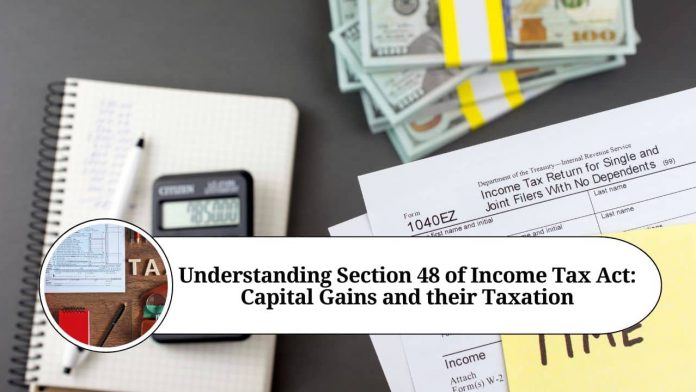Section 48 of the Income Tax Act, of 1961 deals with the computation of capital gains and their taxation. Capital gains are the profits made from the sale of capital assets such as real estate, shares, and bonds. This section lays down the method for calculating capital gains, the exemptions available, and the rates of taxation applicable to them. In this article, we will discuss the provisions of section 48 in detail.
Computation of Capital Gains
Section 48 defines capital gains as the difference between the sale price of a capital asset and its cost of acquisition. The cost of acquisition includes the purchase price of the asset, along with any expenditure incurred in acquiring or improving it. The cost of acquisition can also include any borrowing costs or interest paid on loans taken for the acquisition of the asset.
The sale price of the asset includes the amount received on sale, along with any expenses incurred on the sale such as brokerage fees, legal fees, and transfer charges. The net result of subtracting the cost of acquisition from the sale price gives the capital gain.
Types of Capital Gains
There are two types of capital gains, short-term capital gains, and long-term capital gains. The distinction between the two is based on the holding period of the asset.
Short-term capital gains arising from the sale of assets held for a period of up to 36 months. The gains are added to the income of the taxpayer and taxed at the applicable income tax rate.
Other Useful Links:
Long-term capital gains arising from the sale of assets held for a period exceeding 36 months. The gains are taxed at a lower rate than short-term capital gains, currently at 20% with indexation or 10% without indexation. Indexation is the process of adjusting the cost of acquisition for inflation.
Exemptions and Deductions
Section 48 provides for certain exemptions and deductions to reduce the tax liability on capital gains. The exemptions available are:
- Exemption under Section 54: If the capital gain arises from the sale of a residential property, the taxpayer can claim an exemption under Section 54 if the sale proceeds are invested in another residential property within two years or constructed within three years.
- Exemption under Section 54F: If the capital gain arises from the sale of any other capital asset other than a residential property, the taxpayer can claim an exemption under Section 54F if the sale proceeds are invested in a residential property within one year before or two years after the sale, or in the construction of a residential property within three years.
- Exemption under Section 54EC: If the capital gain arises from the sale of any capital asset, the taxpayer can claim an exemption under Section 54EC if the sale proceeds are invested in certain notified bonds issued by the National Highways Authority of India (NHAI) or Rural Electrification Corporation (REC) within six months of the sale.
In addition to the exemptions, certain deductions are also available to reduce the taxable capital gains. These include:
- Cost of acquisition and improvement: The cost of acquisition and improvement of the asset can be adjusted for inflation using the Cost Inflation Index (CII). The CII is released by the Central Board of Direct Taxes (CBDT) every financial year.
- Expenses of sale: The expenses incurred on the sale of the asset can be deducted from the sale price.
- Transfer expenses: The expenses incurred on the transfer of the asset such as stamp duty and registration charges can also be deducted from the sale price.
Conclusion
In conclusion, section 48 of the Income Tax Act, of 1961 is a crucial provision that deals with the taxation of capital gains. The section lays down the method for calculating capital gains, distinguishes between short-term and long-term capital gains, and provides for exemptions and deductions to reduce the tax liability on capital gains. Taxpayers should understand the provisions of the section and plan their investments accordingly to maximize their returns and minimize their tax liability.




















